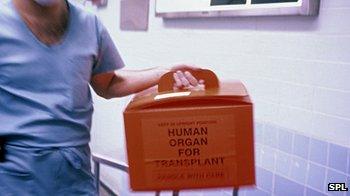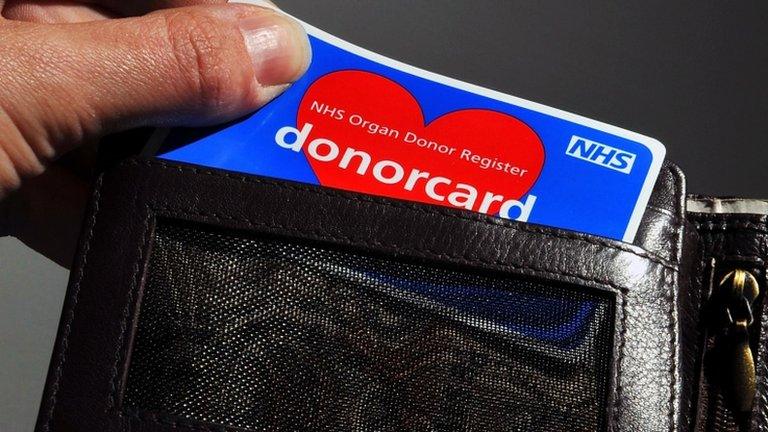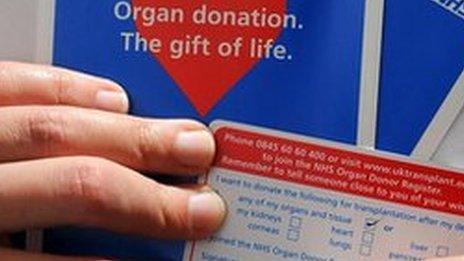The most useful thing you'll do today?
- Published
- comments

4 out of 10 families still refuse consent for organ donation
What's the most useful thing you have done today? Could you spare two minutes that could - one day - perhaps decades in the future - save a life?
Joining the Organ Donor Register, external is simple. Nearly 20m people in the UK - almost one in three of the population - has done it. As well as signing up online, you can do so when you register for a driving licence, join a GP surgery - even when applying for a Boots Advantage card.
There is no upper or lower age limit. Children can join and pensioners.
The other vital thing is to discuss your decision with your loved ones. Around four in 10 families refuse permission for organ donation but that drops to just one in 20 where people have signed the register and made their wishes known.
Once you have signed, what are the chances of your organs ever being used? Around half a million people die each year in the UK and yet just 5,000 of those are eligible for donation.
Firstly you need to die in hospital. Most donors have been on a ventilator in intensive care - usually as a result of a severe head injury, stroke or brain bleed. This is switched off only after two senior doctors have performed tests to confirm brain death. They are known as heart-beating donors. In limited circumstances, some patients not on a ventilator can also donate organs like the kidneys - they are called non heart-beating donors.
Of the 5,000 potential deceased organ donors last year, the actual number was just over 1,200. That is still a significant achievement as it represents a 50% increase in five years.
It was achieved through the introduction of more than 200 specialist nurses to cover all major hospitals, who discuss organ donation with families. Most are former intensive care nurses; they know how and when to raise the subject.
Every hospital also now has a clinical lead for transplantation, and donation committees - to raise awareness of the issue.
But three people still die each day in the UK because of the shortage of organs.
Opt out system
So apart from encouraging more people to sign the register, what else can be done to improve transplant rates?
The issue is in the news because the Welsh assembly is voting on whether to change to an opt-out system of organ donation.
Put simply, this means that instead of signing the organ donor register to signify your willingness to donate, consent would be assumed. Those who do not want to donate would fill in a form online opting out of donation.
This would take the final say out of the hands of relatives, although surgeons have made it clear that they would not go against the wishes of families who were set against allowing donation.
Wales would be the first part of the UK to move to an opt-out system and it would not come in for another two years. A major public information campaign would be needed across Wales before it was introduced.
"Finely balanced"
The Welsh government estimates it could lead to a 25% increase in donors - from 65 a year to 80.
But five years ago an independent report from the Organ Donation Taskforce , external said the question of whether to change to an opt-out system was "finely balanced".
The Taskforce, led by Elizabeth Buggins, said although an opt-out system might deliver benefits, there was a clear consensus against change because it carried a "significant risk" of making the current situation worse.
Their report concluded that such a system "has the potential to undermine the concept of donation as a gift, to erode trust in NHS professionals and the Government, and negatively impact on organ donation numbers."
The high donation rate in Spain is often used as an example of the success of presumed consent. Spanish transplant officials say it is their effective infrastructure which is the key rather than the opt-out system.
One fascinating detail from the 2008 Taskforce concerns Britons living in Spain who are faced with the question of organ donation. When they are approached in Spanish hospitals, the family refusal rate falls to 9% compared with 43% in the UK.
NHS Blood and Transplant has to work with all four UK governments and has largely stayed out of the debate about whether to move to an opt-out system. It will be publishing a new strategy for organ donation later this month.
Expect that to focus on raising awareness of Organ Donor Register and the need for individuals to make the effort to join it.
- Published2 July 2013

- Published1 July 2013
